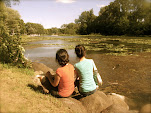Erich Auerbach, "The Philology of World Literature" (1952)
英译者Jane O. Newman, in
, ed. James I. Porter (Princeton University Press 2014), 253-266.
按:Auerbach此文写作于1952年,冷战阴云笼罩下的土耳其。
……
In general, however, as I stated at the outset, different cultures have begun to resemble one another much more rapidly and completely these days than a humanist of the Goethean persuation might want to endorse. And there appears to be no reasonable likelihood that any such differences as remain between the cultures will be able to be settled by any means other than force. The idea of world literature that I am proposing here, which conceives of world literature as a diverse backdrop to a common human fate, no longer seeks, then, to achieve what is in any case already underway (even if it is happening entirely differently than one might have hoped). I accept as inevitable that world culture is in the process of becoming standardized.
总而言之,像我在文章开头所指出的那样,如今不同的文化之间变得越来越相似,其速度之快、与程度之完全,恐怕很难让一位歌德式的人文学者接受。而这些残存的文化差异,却很难以武力之外的其它方式取得妥协。我在此所提出的「世界文学」这一概念--我把它设想为衬托人类共同命运的斑斓布景--也就因此没有必要再去争取一个反正已经在发生的事实,尽管它发生的方式完全不是我想要看到的。我只好接受它作为事实:世界文化正在走向标准化的路上一去不返。
But I do hope that my understanding of world literature will allow those nations that are in the midst of this fateful convergence to focus with greater precision on what is happening to them in these, their last productive moments of variety and difference, so that they can remain mindful of the process and make it part of their own mythologies. If they do so, their awareness of the abundance and depth of intellectual and spiritual developments over the past millennia will not wither and die. It would be fruitless even to speculate about what long-term impact such an effort might have; the task at hand is only to create the possibility that it might have one. ... It might even help us accept what is happening to us with greater composure, and allow us to not despise our enemies all too blindly, even when it is our mission to fight them. In this sense, my idea of world literature and its corresponding philology is no less human and no less humanistic than its predecessor.
但我仍希望--我所理解的世界文学能够让这些正走向归一化的宿命之路上的国族更为准确地体察正在发生的事情,在这最后体现他们之间多样化与差异的时刻,好让他们一直记得这个过程,并将其编入自己的神话里。如能这样,他们也就不会轻易地把自己民族在过去千年内累积的深厚智识与灵知一旦忘却。现在甚至还都不是预测研究世界文学的这些工作能有什么长远影响的时候;我们目前的任务仅仅是为其将来可能有的影响创造一点可能性。……这样的工作还可能帮助我们更镇定地面对正在发生的一切,并且让我们不要过于盲目地憎恨我们的敌人--即使我们不得不与他们斗争。这样说来,我对世界文学以及其所对应的语言学的期望与它的前身(歌德)一样,是立足于人的人文主义。
===
他后面又谈到,「传统古典文学训练下成长起来的老一辈学者日益凋零,而可供研究的材料又日益加增,研究在新时期应该如何继续」的问题。大概谈到如下几点:
--学海无涯,人生苦短,但学术最终仍是每个人自己去求证悟道的过程,合作在某些情形下很必要,但不能代替学者自身的成长。
--百科全书式的学习已经不合用了,因为没有人能够漫无目的地识记所有东西。但如果一边提出问题,一边学习,所学到的东西则因为合用而容易被牢记。
--决定研究的起点(Ansatzpunkt)最重要,也最困难。忍不住再抄一段:
(p.262) In order to conduct a large synthetic project, it is necessary to find a starting point, a tangible hook, as it were, that allows one to lay hold of one's object of study. This point must single out a clearly circumscribed and easily surveyed set of phenomena. And the interpretation of these phenomena must possess an illuminating power that is sufficient to organize and interpret a far broader range of phenomena than the point from which it started.
要作一项综合性的研究,必须先找到一个起点,一个具体的引子,让人能够找到研究的具体对象。这个起点必须能够引出一组边界清晰而容易概览的现象。而学者对于这组现象的阐释则必须拥有一种明彻的力量,能够让他/她对某些比起点更宽泛的历史现象作出组织与解释。
--好的起点可能有很多种,但绝不应该是完全基于一种对“典型”或学界术语的讨论(因为只能证实或证伪一个空的预设),除非在某一上下文中,能够用材料来支撑某术语的所指。更多的情况下,好的起点起源于令人困惑的现象,或能够用语言学术语描述的具体例子。越切实的起点,往后越能有发散的启示。
--“事物本身应能在研究中有发言权。”
--“陈词滥调总是在前方潜伏着等你。” They are ever ready to interject themselves into our writing as soon as we drift away from the energy that the tangible exerts. It is thus that the occasional writer--and many readers--are led to mistake an appealing cliché for the thing itself.
与正在写论文的各位共勉。
最后一段让我看得眼眶湿润:
Yet, our philological home is the earth. It can no longer be the nation. The most precious and necessary thing that philologists inherit may be their national language and culture. But it is only in losing--or overcoming--this inheritance that it can have this effect. We must now turn -- albeit under different conditions -- to what the pre-nation-state culture of the Middle Ages already possessed, to the knowledge that the human spirit itself is not national.
但是,地球终究是我们语言的家园,而不是某个国家。每个语言学者最珍贵和必要的财富是她/他所继承的民族语言与文化,但只有放弃它--或者超越它--之后,这笔遗产才能真正变得珍贵和有用。虽然境况各异,但我们必须转向中世纪已经有过的前民族-国家时代的文化,也必须明白:人文精神本身不是民族特有的。
……(Hugh of Saint Victor,
Didascalicon 3.20)
"The man who finds his homeland sweet is still a tender beginner; he to whom every soil is as his native one is already strong; but he is perfect to whom the entire world is as a foreign land."
Hugh's intended audience consisted of those individuals whose goal it was to free themselves from their love of this world. But it is also a good path to follow for anyone who desires to secure a proper love
for the world.
“弱者爱其故乡;强者四海为家;视此世界为异乡者,则近圣。”(我的翻译)
Hugh of St. Victor所面对的读者们,是一心想摆脱对此世的爱欲牵缠的人。而我们今天也许还可以沿着这条路,去追寻
为了这个世界的一种适切的爱。
Labels: History_General, Literature



